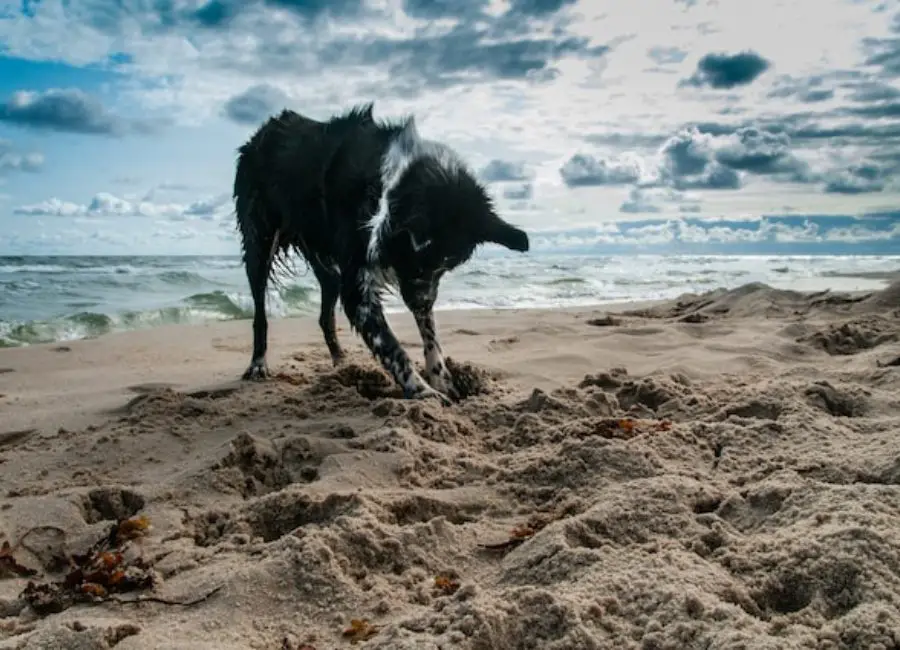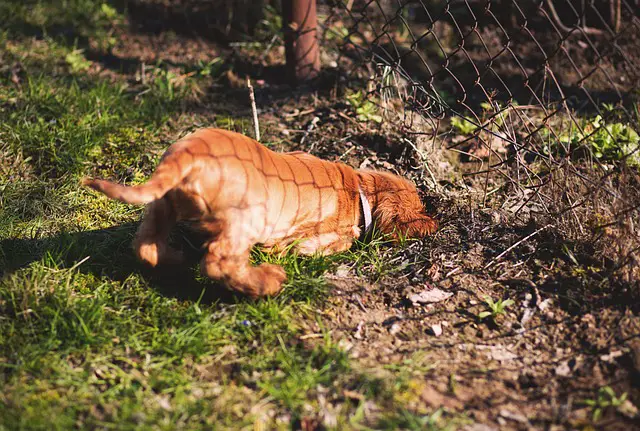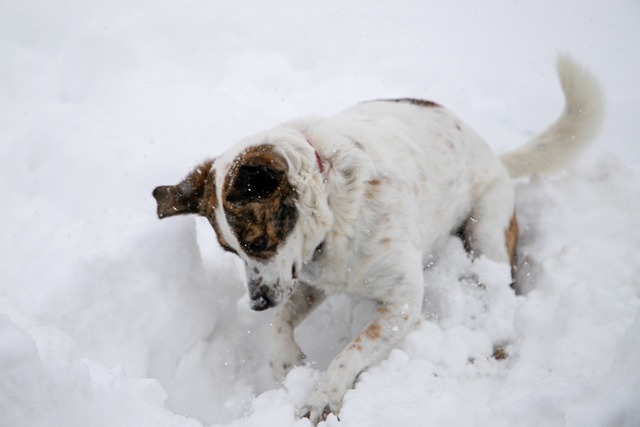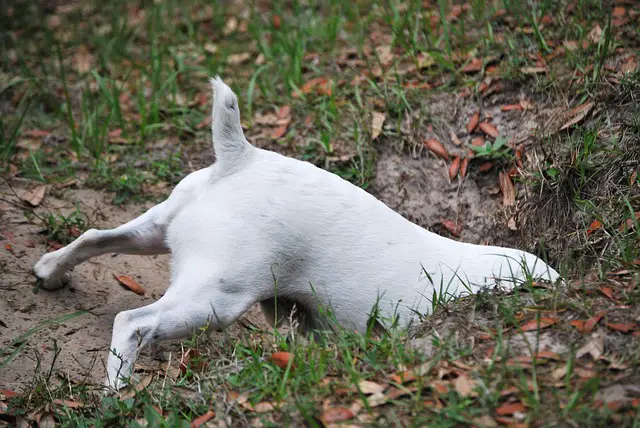Dealing With Dogs That Dig Holes The Right Way

Let’s discuss how to handle dogs that dig holes…
Hey there fellow dog lovers! Are you tired of constantly filling up the holes in your backyard? Well, you’re not alone!
Many dog owners face this problem with their furry friends. But don’t worry, we’ve got some great tips and tricks to help you stop those dogs that dig holes.
Keep reading to find out more!
Breeds of Dogs That Dig Holes
There are many breeds of dogs that are known for their love of digging holes. Here are some of them:
- Dachshund: This German breed was originally bred to hunt badgers and other burrowing animals, so it’s no surprise that they have a natural instinct to dig.
- Terrier breeds: Many terrier breeds, such as Jack Russell Terriers and Yorkshire Terriers, were also bred for hunting and had a strong desire to dig.
- Beagle: Beagles are known for their keen sense of smell and love to follow their noses, which sometimes leads to digging.
- Siberian Husky: Huskies have a strong instinct to dig and are known for digging snow caves in the wild to stay warm.
- Border Collie: These highly intelligent dogs have a lot of energy and like to occupy themselves with digging and other activities.
- Australian Shepherd: This breed was originally bred for herding and has a lot of energy and intelligence, which can lead to digging.
- Basset Hound: These hounds were bred for tracking and have a strong sense of smell, which can lead to digging in search of buried treasures.
- Boxer: Boxers are energetic and playful dogs that sometimes release that energy through digging.
- Shetland Sheepdog: These herding dogs have a lot of energy and love to keep busy, which can sometimes translate to digging holes.
Why Do Dogs Dig Holes?

There are various reasons why dogs might dig holes, and the behavior can sometimes be difficult to curb.
Here are some common reasons why dogs dig holes:
- Boredom: Dogs can quickly become bored, and digging is often a way for them to entertain themselves.
- Anxiety: Some dogs may dig holes as a way to deal with anxiety or stress.
- Seeking comfort: Dogs will sometimes dig holes to create a cool spot to rest or to try to escape the heat.
- Hunting instinct: Certain breeds of dogs have a strong hunting instinct, and digging is a common behavior for them.
- Trying to escape: Dogs may dig holes as a way to escape when they are feeling trapped or confined.
- Hiding or storing objects: Some dogs will dig holes to hide or store their favorite toys or objects.
- Breed tendencies: Certain breeds of dogs are known for their digging tendencies. For instance, terriers were originally bred for hunting rodents and will often dig to catch their prey.
- Environmental stimuli: Dogs might dig holes as a response to external stimuli such as odors, sounds, and movement.
- Genetics: Finally, some dogs simply have a genetic predisposition to digging, which can be difficult to curb.
If you’re struggling with a dog that likes to dig, there are various tactics you can try to redirect the behavior, such as increasing exercise or providing mental stimulation.
Learn more about making your dog feel safe.
When Does Digging Become a Concern in Dogs
Digging in dogs becomes a concern when it causes damage to property, disrupts the environment, or poses a safety risk to the dog or others.
Additionally, if the digging behavior is excessive and interfering with the dog’s daily routine, such as eating and sleeping, it may be a sign of an underlying behavioral or medical issue that should be addressed.
It is important to identify the underlying cause of the digging behavior to find the appropriate solution for the dog’s well-being and safety.
How to Manage and Minimize Digging Behavior in Dogs

The following are some common ways to manage and minimize digging behavior in dogs:
1. Create a Dedicated Digging Area
Dogs will occasionally dig as a fun activity or as a natural impulse. You may reroute their propensity for digging by designating a certain area in your yard where digging is permitted.
Select a location far from flowerbeds or other protected areas. Dig a shallow pit, fill it with loose soil or sand, and prepare this designated digging area.
Bury toys, treats, or bones for your dog to find in order to encourage exploration and digging in this area.
When they use this specific location, acknowledge and praise them to reinforce the notion that this is the proper place for digging.
2. Reinforce Boundaries
Setting up clear limits will help stop your dog from digging in unfavorable places.
To divide locations you want to keep safe, use physical barriers like fences, garden borders, or chicken wire.
This will discourage your dog from digging thereby making it harder for them to access such spots.
The key to maintaining these boundaries is consistent training. Teach your dog manners such as “stay” and “leave it,” and give them praise and treats when they comply.
They will eventually come to respect your boundaries with practice and patience.
3. Provide Adequate Exercise
Exceedingly high levels of energy and boredom are two of the main causes of dogs digging.
You may lessen your dog’s desire to engage in damaging habits like digging by making sure that your canine friend gets enough exercise.
Regular jogging, walks, or games of fetch can assist keep them intellectually active and help them expend energy.
Furthermore, it’s as crucial to exercise your mind. Play interactive games, use puzzle toys to train your dog’s obedience, or do other mental exercises.
They become exhausted through mental activity, which also gives them a constructive outlet for their energy.
Learn more about training mistakes in dogs to avoid.
4. Make the Digging Area Unattractive
You can make those spots less enticing to your dog if they continue to dig in undesirable places.
Use gravel, rocks, or chicken wire to cover the ground. Your dog will find it harder and more painful to dig in these materials.
Placing motion-activated sprinklers or sound equipment close to the locations your dog usually targets is an additional efficient tactic.
When activated, these gadgets release a quick rush of water or a loud noise that startles your dog and deters them from digging further.
5. Deter with Odors
Dogs have an acute sense of smell, and some smells can prevent them from digging in particular places.
Decide which areas of your dog’s property are prone to digging, and then sprinkle those areas with things that dogs dislike, such vinegar, citrus peels, or diluted essential oils like eucalyptus or citronella.
In order to keep dogs away from specific regions, you might also consider employing commercially available items.
Carefully follow the directions and reapply as necessary. Your dog won’t dig in those areas again because of the disagreeable smell.
6. Increase Supervision
In particular, if they are bored or restless, dogs may be more likely to dig when left unattended.
You should keep an eye on your dog more often, especially when they are inclined to dig, including when they are alone in the yard or when they are acting restless.
When you see them digging, divert their focus to something more acceptable.
Invite them over, get them involved in an activity or training session, or give them a toy to play with.
You may prevent digging and nudge them in the direction of better behavior by actively interfering and correcting their behavior.
7. Ensure Sufficient Shelter and Comfort
In hot weather, dogs may dig holes to find a cooler ground or to make a comfortable den-like environment.
Make sure your animal companion has access to an appropriate place to shelter, some shade, and a cozy spot to rest.
Give them access to a covered area or a doghouse that is well-insulated so they may escape chilly weather.
In particular during the sweltering summer months, make sure they always have access to fresh water.
By taking care of their basic need, you can lessen their inclination to dig for solace or relief.
8. Maintain a Consistent Routine
Dogs enjoy routine, so keeping a set daily plan can help them avoid digging habits.
Consistently schedule meals, walks, and playtimes to give your dog enough of attention and stimulation throughout the day.
Maintaining their mental and emotional health requires consistency.
Your scheduled routine will ease their restlessness and anxiousness, which will make them less inclined to use digging as a source of amusement or stress relief.
9. Provide Adequate Mental Stimulation
Dogs’ digging behavior is frequently significantly influenced by boredom. Ample mental stimulation can help your furry pet focus their energy on more positive endeavors.
Provide a selection of activities that call on problem-solving abilities, treat-dispensing puzzles, and interactive toys.
Teach new instructions or tricks to your dog during routine training sessions.
This not only tests their intelligence but also deepens the link you share with your animal companion.
In order to stop undesirable activities like digging, mental stimulation is a great technique.
The Dangers of Unsupervised Digging in Dogs

Unsupervised digging in dogs can pose various risks. For instance, pets may try to escape enclosures by digging under fences, causing injuries to themselves in the process.
Leaving dogs unsupervised in the yard may also lead to excessive barking and destructive behavior, which can annoy neighbors.
Moreover, when left unsupervised, dogs may be at risk of getting stuck or entangled in certain areas or may consume toxic substances.
To prevent these dangers, it is recommended to supervise dogs when they are outside and provide them with adequate entertainment and activity to satisfy their digging tendencies.
The Role of Age and Training in Curbing Digging Habits in Dogs
There is evidence to suggest that training can play a role in curbing digging habits in dogs.
Training classes with dogs can be helpful in providing both the owner and the dog with the tools and knowledge needed to address problematic behaviors, including digging.
Additionally, exercise is important in managing a dog’s behavior and can help to redirect energy away from destructive behaviors like digging.
The age of the dog may also be a factor, as puppies may require more supervision and consistent training to learn appropriate behavior, while older dogs may have established habits that are more difficult to overcome.
However, there is no one-size-fits-all approach, and different dogs may respond differently to training methods.
It is important for owners to work with a qualified trainer and customize a training approach to fit their dog’s specific needs and temperament.
Related Questions
Why do dogs love to dig holes?
Dogs dig holes for various reasons, such as burying objects, finding cool spots to lay in, or escaping from the heat. They may also do it out of boredom, especially if they are left alone for long periods. In some cases, digging can also be a sign of anxiety or stress.
Can I train my dog to stop digging holes?
Yes, you can train your dog to stop digging holes. One effective way to do this is by providing plenty of exercise and mental stimulation to keep them occupied. You may also need to redirect their digging behavior by training them to dig in a designated area or providing them with a sandbox or dig pit.
What can I do to discourage my dog from digging holes in the yard?
There are several things you can do to discourage your dog from digging holes in the yard. Some options include covering the dug-up areas with rocks or plantings or applying a harmless deterrent like citrus or vinegar to the area. You can also try spraying your dog with water when you catch them digging or praising them when they aren’t digging.
Can digging be a sign of a health problem in dogs?
Yes, digging can sometimes be a sign of a health problem in dogs. For example, dogs with gastrointestinal issues may dig in an attempt to soothe their stomach or to find minerals in the soil. In some cases, dogs may also dig in an attempt to relieve pain or discomfort from arthritis or other conditions.
What breeds of dogs are more prone to digging?
While all dogs can dig, some breeds are more prone to digging than others. Breeds that were originally bred for digging or hunting, such as terriers, dachshunds, and beagles, are often more likely to dig than other breeds. However, any breed of dog can develop a digging habit.
Is digging bad for a dog’s health?
Digging itself is not necessarily bad for a dog’s health, but the behavior can result in injuries or other health problems. For example, dogs that dig under or around fences may be at risk of escaping and getting lost or injured. Additionally, if a dog ingests soil or other foreign objects while digging, they may develop digestive issues or blockages.
Conclusion
In conclusion, dogs that dig holes may be frustrating at times, but we can’t help but love our furry friends unconditionally.
Instead of punishing them for their natural instinct, let’s find ways to redirect their digging behavior, such as providing digging zones or engaging them in more physical activities.
At the end of the day, a little bit of training and patience goes a long way in keeping a happy and healthy relationship with our beloved pooches.
So embrace the digging and enjoy the continued companionship of your furry best friend!
